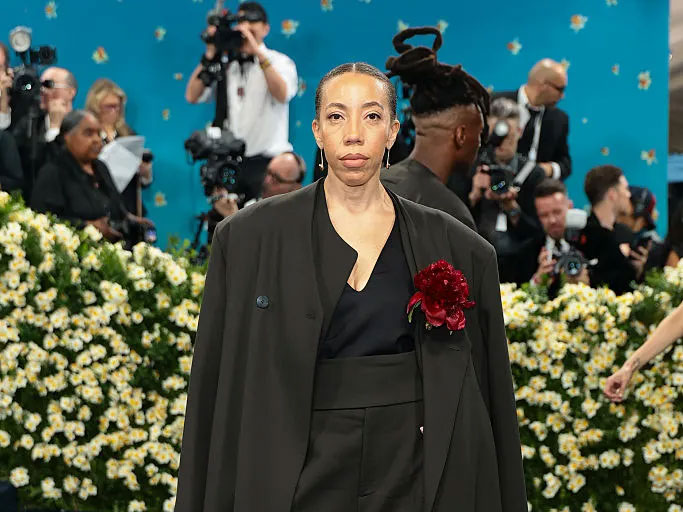Amy Sherald, the painter who canceled her exhibition “American Sublime” at the Smithsonian’s National Portrait Gallery in July due to censorship issues, has broken her silence in a MSNBC article.
Sherald canceled her September show after the museum considered removing her painting Trans Forming Liberty (2024), depicting model and performance artist Arewà Basit as a Black transgender Statue of Liberty, which this month graced the cover of the New Yorker.
At the time, Sherald spoke out about the incident to the New York Times, explaining, “While no single person is to blame, it’s clear that institutional fear shaped by a broader climate of political hostility toward trans lives played a role. This painting exists to hold space for someone whose humanity has been politicized and disregarded. I cannot in good conscience comply with a culture of censorship, especially when it targets vulnerable communities.”
Related Articles

In her latest, longer consideration of the events, Sherald still stands behind that initial statement, and this time adds more about the goings-on at the Smithsonian.
A couple weeks before Sherald canceled her show, it was reported that Smithsonian Institution’s exhibitions would undergo a review by the White House, which claimed the institution’s shows have skewed too far from “the greatness of our nation or the millions of Americans who have contributed to its progress” and should, instead, “celebrate American exceptionalism”.
Though the Smithsonian receives about two-thirds of its $1 billion annual budget from the federal government, it is not considered a federal entity.
For her part, Sherald explains in her August op-ed, “When governments police museums, they are not simply policing exhibitions. They are policing imagination itself.”
Adding, “This country’s story has always been a contradiction. Slavery alongside freedom. Erasure alongside invention. Art carries what is too heavy for language to hold. And museums, at their best, give us the full picture rather than the flattering one.”
Sherald also cites the complex relationship the museum has had with sitting presidents, among them, Woodrow Wilson who “’pressured the institution to impose Jim Crow‘ but that ‘its partial autonomy from the federal government allowed it to resist these pressures’”, and Herbert Hoover who, by way of two Smithsonian commissioners, allowed the traveling exhibition “American Negro Artists” to come to the Smithsonian—albeit in a dimly lit foyer.
More recent examples include the Enola Gay exhibition which was heavily redressed in 1995 due to political backlash about centering the impact of the atomic bomb on the Japanese, as well as congressional pressure to to censor parts of the Smithsonian’s LGBTQ+ exhibition “Hide/Seek” in 2010.
While the Smithsonian previously affirmed its independence from curatorial interference from the White House, its programming and leadership have come under direct scrutiny from the Trump administration. In January, the Smithsonian announced the end of its diversity, equity and inclusion (DEI) programs, as well as a hiring freeze for all federal positions. In March, a new executive order instructed the Smithsonian’s Board of Regents to eliminate “improper, divisive or anti-American ideology” within its museums. In May, National Portrait Gallery director Kim Sajet resigned after Trump said he fired her for supporting DEI.
Sherald further cites issues that developed shortly after she decided to cancel such as the removal of Trump’s impeachment from public display at the National Museum of American History (which has since been restored with an updated placard) and Trump’s complaints that the institution has focused too much on “how bad slavery was” while also dubbing museums “the last remaining segment of ‘WOKE.’”
Sherald offered shifting attitudes as further reason for rescinding her show: “It became clear during my exchanges with the gallery how quickly curatorial independence collapses when politics enters the room.”
Sherald, now somewhat ironically, became a household name in 2018 for her portrait of former first lady Michelle Obama. She is best known for her pensive pastel renderings of Black Americans imbued with melancholy and joy, and underpinned by issues of the political realities of American life.
Featuring some 50 works by Sherald, “American Sublime” was one of the largest and most comprehensive presentations of her work to date. The exhibition was originally organized by the San Francisco Museum of Modern Art and subsequently traveled to the Whitney Museum. The iteration that was slated for the Smithsonian’s National Portrait Gallery would have marked the first solo presentation of its kind by a Black contemporary artist at the institution.
Sherald finished her piece, stating, “Museums are not stages for loyalty. They are civic laboratories. They are places where we wrestle with contradictions, encounter the unfamiliar and widen our circle of empathy. But only if they remain free.
“If they do not, we lose more than exhibitions. We lose the public spaces where imagination takes a stand against power. And when that happens, the stories we inherit and the futures we can envision will no longer be our own.”
In response, the Smithsonian told ARTnews in a statement, “The Smithsonian has a long-standing and valued relationship with artist Amy Sherald. We are and continue to be deeply appreciative of her and the integrity of her work. While we understand Amy’s decision to withdraw her show from the National Portrait Gallery, we are disappointed that Smithsonian audiences will not have an opportunity to experience American Sublime.
“The Smithsonian strives to foster a greater and shared understanding. By presenting and contextualizing art, the Smithsonian aims to inspire, challenge and impact audiences in meaningful and thoughtful ways. Unfortunately, we could not come to an agreement with the artist. We remain appreciative and inspired by Ms. Sherald, her artwork and commitment to portraiture.”
Update on Monday, August 25 at 2:15pm: This article was updated to include a response from the Smithsonian Institute.

